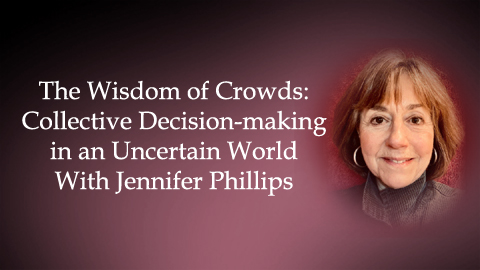 |
 |
|
August 27, 2021 No Gurus: Finding Wisdom in the Collective The shining spark of truth cometh forth only after the clash of differing opinions. — ‘Abdu’l-Bahá  It’s among humanity’s biggest questions: as education becomes more universal in a wired world where problems assume global proportions, how do we make wise decisions? In the most recent Big Ideas presentation, city planner emeritus and noted bibliophile Jennifer Phillips cited several books with refreshing views on humanity’s ability to thrive. Phillips — a veteran of decades of urban problem-solving, and of the Bahá’í community’s development processes — focused on James Surowiecki’s 2004 book The Wisdom of Crowds: Why the Many Are Smarter Than the Few. He argues that “under the right circumstances, groups are…often smarter than the smartest people in them…. it’s almost as if we were programmed to be collectively smart — especially under conditions of uncertainty.” Ms. Phillips helped an online group of 65 to explore this encouraging notion, and how the Bahá’í experience reinforces it. Given the Bahá’í Faith’s absence of clergy, its systematic collective learning, the Ruhi training institute that now informs Bahá’í spiritual education across the globe, its non-partisan and revolutionary electoral process and governance and, finally, the Bahá’ís’ distinctive approach to consultation, their community exemplifies much that The Wisdom of Crowds advocates. “The crowd’s judgment,” writes Surowiecki, “is going to give us the best chance to make the right decision….[T]raditional notions of power and leadership should begin to pale…” Surowiecki presents numerous contemporary examples from business, politics and the social sciences, offering five conditions for a “crowd” to demonstrate “wisdom”. The contributions of participants must be independent; in many groups, talkative people influence others through the phenomenon of “group-think.” The process must be decentralized, drawing on local, particular knowledge and not imposing hierarchies of decision. There must be a clear method of aggregation, turning personal judgements into a collective decision. Crucially, members must trust that the group’s work is for the benefit of all. Finally, the principal guarantor of success in the “wise crowd” is the diversity of thought present. “Even having a single dissenting opinion,” Phillips noted, “makes the group wiser.”. Has Surowiecki studied the Bahá’í model? His findings certainly support and amplify it. (Journalist Amanda Ripley’s High Conflict specifically praises the Bahá’í administrative system as an antidote to toxic contention.)
|
|
|